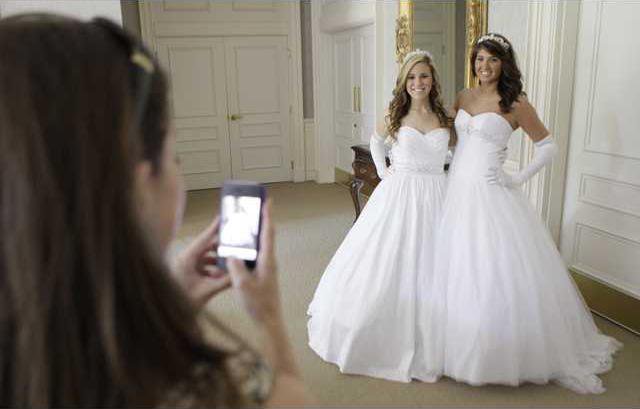PLANO, Texas — Sure, they still learn to take a graceful bow while wearing elegant white dresses and tiaras, but some debutantes are also taking in the finer points of car repair, nutrition and self-defense.
"It’s not just all about being pretty," said 17-year-old Sloane Towery as a stylist fixed her hair for her formal portrait. "I’ve learned about etiquette, and how to fight — kind of."
As one of 19 debutantes in the program benefiting the Plano Symphony Orchestra, her run-up to the presentation ball this fall has included instruction on everything from exhibiting grace and poise to how to jab her fingers into the eyes of an attacker.
Ida Gephart, director of the debutante program in the Dallas suburb, said that when the program started about eight years ago, organizers decided it shouldn’t just be the traditional series of parties leading up to the presentation ball.
Seventeen-year-old Emily Wisner wanted to be part of the program after her mother’s rundown included the phrases "big white dress" and "you get your hair and makeup done."
But so far, the most useful part of her debutante training has been the car repair class. Two days after taking it, she was able to help a friend jumpstart her car.
"It was so unexpected that I’d learn the most from it," she said.
Her mother, Peggy Wisner, said, "I always thought of it as truly 100 percent social: parties, a presentation, you would learn manners. But I think they’ve taken this program a bit deeper than that."
Debutante balls historically were a way for wealthy families to introduce their daughters into society, with private parties where they might meet suitable husbands. Today, while some debutante organizations admit members based on lineage, others have a more democratic method: They choose among applicants who fill out forms.
As debutante programs evolved in the 20th century, many developed a strong component of community involvement, and were sponsored by or raised money for a charitable or civic organization. The Plano debutantes support the symphony not only with a portion of the fees they pay to participate in the program, but also by volunteering and fundraising.
Debutante programs vary around the country by age group and by how long their seasons run, said Teresa Robinson, a professor at Middle Tennessee State University who directs a chapter of the National League of Junior Cotillions in Murfreesboro, Tenn. The chapter teaches skills like etiquette and dancing to middle-school children in the hope that they might eventually enter a debutante program.
Some debutante programs have started to incorporate philanthropic work that’s more hands-on than throwing a fundraiser. When Robinson’s daughter went through a debutante program in Murfreesboro about five years ago, they helped build a Habitat for Humanity house. And the Old Dominion Cotillion, a Washington, D.C., area program, has expanded traditional debutante activities in the last 10 years to include volunteering at a homeless shelter, according to spokeswoman Rebecca Gardner.
Gardner said that in addition to classes on dancing, poise, etiquette and entertaining, the group, which held its 20th anniversary ball this month, has also toured the U.S. State Department, held classes on personal safety and one on car maintenance titled "It’s a Dipstick, Not a Lipstick."
"Now, we’ve really become a modern organization," she said.
Cameron Napier, who debuted in Montgomery, Ala., more than a half-century ago, remembers when the tradition was more focused on socializing. At first she wasn’t sure she wanted to participate, telling her mother, "They used to do that in ‘Gone With the Wind’ days because they were sheltered," but in the end, "it was a delightful experience at the time I made it in 1955. When all these lovely people give you parties, you learn how to converse with people of all ages about ideas."
She developed a lifelong interest in the debutante tradition, collecting clippings and writing on the subject, but says she doesn’t see a need for any embellishments to the tradition of a string of parties running up to a presentation ball. Still, she wishes "all the people starting this new method good luck."
"I’m all for training. I’ve said for years that there isn’t much in the world that can’t be cured by manners and a little restraint," she added.
One thing that isn’t likely to change is the timeless lure of frilly dresses and fairy tale balls. Even for girls learning how to jumpstart a battery, fend off an attacker or work in a soup kitchen, "the culmination of the debutante season is always going to be that grand ball," said Robinson.

